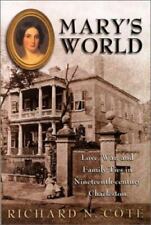The Village Museum
Mary's World, Love, War & Family Ties in 19th Century Charleston ~ Richard Cote
Mary's World, Love, War & Family Ties in 19th Century Charleston ~ Richard Cote
Couldn't load pickup availability
Born to affluence and opportunity in the South's Golden Age, Mary Motte Alston Pringle (1803-1884) represented the epitome of Southern white womanhood. Her husband, William, was a wealthy rice planter who owned four plantations and 337 slaves. Her thirteen children included two Harvard scholars, seven world travelers, three socialite daughters, a U.S. Navy war hero, six Confederate soldiers, one possible Union collaborator, a Confederate firebrand trapped in the North, an expatriate bon vivant in France, and two adventuresome California pioneers.
Mary’s World illuminates in lavish detail the world and psyche of this wealthy, well-educated, highly-principled nineteenth-century Southern planter's wife. This biography was drawn directly from over 2,500 pages of Mary’s unpublished letters, journals and diaries, none of which, she could have imagined, would ever be read by strangers. Therein lies their power.
In her own words, Mary tells us about the joys, sorrows, frustrations, and terrors she and her family faced before, during, and after the Civil War. We also learn about the vastly different lifestyles, food, clothing, and experiences of their 337 slaves. Mary’s World also pays special attention to Lucretia “Cretia” Stewart, Mary’s favorite servant, Cretia’s husband, Scipio, and their free descendants, some of whom worked for Mary’s grandchildren well into the twentieth century.
Between 1861 and the Union occupation of Charleston in 1865, Mary and her husband, William, stood helpless as two sons were killed, another was driven insane, their slaves were freed, their entire social class was destroyed. Mary felt that God had forsaken her and the the Confederacy. Unable to adapt to the realities of post-war life, she and William died forlorn relics of The Lost Cause. How they, their children, and slaves lived before the Civil War, clung desperately to life in the eye of the maelstrom, and coped – or failed to cope -- with its bewildering aftermath is the story of this book. The letters and images they left behind offer priceless insights into the roots of Southern social history.
From the Publisher: Mary Pringle's letters, journals, and account books show her as a woman resolutely determined to meet her responsibilities in a world where the veneer of a life of ease often masked deep fissures. As Victorian and Southern culture insisted, Mary was expected to fill many roles: * A charming, dutiful, and fertile companion to her husband;
* A nurturing and instructive mother to her thirteen children;
* A practical manager of the Miles Brewton House, the opulent Palladian mansion in which she lived;
* A responsible mistress of her thirty-two house slaves;
* A benevolent patron of the poor and pillar of her church; and
* An indestructible vessel which preserved and passed on her ancestors' knowledge, traditions, values, beliefs, and property.
Yet just below the surface of her culturally ordained skin lay a woman powerless to control major areas of her own life:
* Born into a family wealthy for generations, and despite her own inherited wealth, she watched helplessly as her husband ran their family into financial ruin.
* The wife of a major Southern slaveowner, she became convinced that slaveholding was morally indefensible and was in conflict with Biblical teachings.
* A woman of great intelligence and learning, she was forced to live out her dreams vicariously through her sons, while she watched her daughters become imprisoned by the same rules which prevented her from achieving her own potential.
Mary Pringle was a vibrant woman torn between her own needs and aspirations and the limitations imposed upon her by Southern Victorian society. Mary's World is an intimate, visceral window into the heart and mind of a well-intentioned woman whose entire world and value system was ground to dust by the grist mill of historic change.
Share


